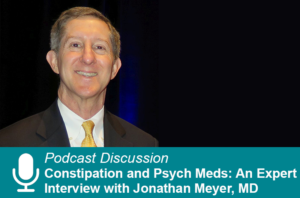Home » A Potentially Lethal Side Effect You Probably Never Heard Of
A Potentially Lethal Side Effect You Probably Never Heard Of

May 7, 2020
From The Carlat Psychiatry Report
Chris Aiken, MD.
Editor-in-Chief of TCPR. Practicing psychiatrist, Winston-Salem, NC.
Dr. Aiken has disclosed that he has no relevant financial or other interests in any commercial companies pertaining to this educational activity.
In January 2020, the FDA issued a strong warning about constipation on clozapine. With a fatality rate of 1 in 1000, this is not just a nuisance side effect, and it can happen with other antipsychotics and psychotropics as well. This type of constipation is caused by slowing of the gut, or gastric hypomotility, and it requires a unique approach. Fiber supplements, for example, could be dangerous. In this article I’ll show you how to manage it.
Slowing of the bowels
Antipsychotics can slow the bowels, mainly through anticholinergic effects but also through serotonin antagonism at 5HT3 and 5HT4. Clozapine, which slows the bowels in 50%–80% of patients, is the worst offender. On average, it takes 4 times longer than normal for food to pass through the intestines when a patient is on clozapine.
The dreaded outcome in all this is paralytic ileus: when the bowels grind to a paralyzing halt. Paralytic ileus is one step from intestinal obstruction, which can progress to bowel ischemia, perforation, sepsis, and death. About 1 in 1000 clozapine-treated patients die from bowel complications, 3–6 times higher than the rate of death from neutropenia on clozapine.
The danger is higher in the elderly, especially in those taking anticholinergics, which increase the risk of intestinal ileus 6-fold when taken with clozapine. The FDA advises minimizing other constipating medications with clozapine, and calls out the anticholinergics by name. Benztropine (Cogentin) and diphenhydramine (Benadryl) are two anticholinergics often used in schizophrenia. Other constipating meds to watch for are iron, treatments for overactive bladder, and iron, NSAIDs, and treatments for urine incontinence.
The problem is not unique to clozapine. There are a few other psychotropics to watch for that can slow the bowels. Tricyclic antidepressants, high-potency first-generation antipsychotics (eg, haloperidol, fluphenazine), and opioids have a risk of paralytic ileus that is comparable to clozapine’s, though the problem is less likely to lead to fatalities on these. Among the second-generation antipsychotics, quetiapine and olanzapine have a risk of ileus that’s 50% less than clozapine’s but more than that of other atypical antipsychotics (Chen HK and Hsieh CJ, Schizophr Res 2018;195:237–244).
Warn the patient
Paralytic ileus is a medical emergency, and the FDA recommends educating patients about it before starting clozapine. First, advise them of the symptoms of hypomotility, as these indicate a need for more aggressive treatment of constipation:
When those symptoms are paired with the more serious signs below, referral to an urgent care center is warranted:
From prevention to treatment
The Porirua Protocol is a step-by-step algorithm developed in Porirua, New Zealand, for constipation on clozapine. The protocol reduced the prevalence of gastrointestinal hypomotility on clozapine from 86% to 50% in a small study (Every-Palmer S et al, CNS Drugs 2017;31(1):75–85). It starts with preventative therapy.
This protocol can be adapted for hypomotility due to other psychotropics by making the preventative step the first-line intervention and moving through the steps as needed from there.
Avoid fiber supplements
Fiber supplements and bulk-forming laxatives may work for everyday constipation, but they should be avoided when slow motility is the cause. Otherwise, the bulk they form can block the intestines. Items to avoid include psyllium (Metamucil), methylcellulose (Citrucel), wheat dextrin (Benefiber), polycarbophil (FiberCon), and fibrous foods like prune juice. The most important dietary tip is to drink lots of water, which keeps fibrous foods from congealing into an obstruction.
TCPR Verdict: The risk of bowel obstruction has changed the standard of care with clozapine. Warn patients about the problem, inquire routinely about the frequency of bowel movements, intervene early with senna and docusate, and know when to avoid bulk-forming agents. These steps are helpful for other constipating psychotropics, particularly in vulnerable populations like the elderly.
Listen to more in this episode of The Carlat Psychiatry Podcast.

General PsychiatrySlowing of the bowels
Antipsychotics can slow the bowels, mainly through anticholinergic effects but also through serotonin antagonism at 5HT3 and 5HT4. Clozapine, which slows the bowels in 50%–80% of patients, is the worst offender. On average, it takes 4 times longer than normal for food to pass through the intestines when a patient is on clozapine.
The dreaded outcome in all this is paralytic ileus: when the bowels grind to a paralyzing halt. Paralytic ileus is one step from intestinal obstruction, which can progress to bowel ischemia, perforation, sepsis, and death. About 1 in 1000 clozapine-treated patients die from bowel complications, 3–6 times higher than the rate of death from neutropenia on clozapine.
The danger is higher in the elderly, especially in those taking anticholinergics, which increase the risk of intestinal ileus 6-fold when taken with clozapine. The FDA advises minimizing other constipating medications with clozapine, and calls out the anticholinergics by name. Benztropine (Cogentin) and diphenhydramine (Benadryl) are two anticholinergics often used in schizophrenia. Other constipating meds to watch for are iron, treatments for overactive bladder, and iron, NSAIDs, and treatments for urine incontinence.
The problem is not unique to clozapine. There are a few other psychotropics to watch for that can slow the bowels. Tricyclic antidepressants, high-potency first-generation antipsychotics (eg, haloperidol, fluphenazine), and opioids have a risk of paralytic ileus that is comparable to clozapine’s, though the problem is less likely to lead to fatalities on these. Among the second-generation antipsychotics, quetiapine and olanzapine have a risk of ileus that’s 50% less than clozapine’s but more than that of other atypical antipsychotics (Chen HK and Hsieh CJ, Schizophr Res 2018;195:237–244).
Warn the patient
Paralytic ileus is a medical emergency, and the FDA recommends educating patients about it before starting clozapine. First, advise them of the symptoms of hypomotility, as these indicate a need for more aggressive treatment of constipation:
- Fewer than 3 bowel movements a week
- Hard or dry stools
- Difficulty passing gas
When those symptoms are paired with the more serious signs below, referral to an urgent care center is warranted:
- Moderate to severe abdominal pain lasting > 1 hour
- Nausea, vomiting
- Abdominal bloating or swelling
- Bloody diarrhea
From prevention to treatment
The Porirua Protocol is a step-by-step algorithm developed in Porirua, New Zealand, for constipation on clozapine. The protocol reduced the prevalence of gastrointestinal hypomotility on clozapine from 86% to 50% in a small study (Every-Palmer S et al, CNS Drugs 2017;31(1):75–85). It starts with preventative therapy.
- Prevention. All patients are given docusate (Colace) 100 mg qhs with senna (Sennosides, Ex-Lax, or Senokot) 17.2 mg qhs along with their first clozapine prescription (Every-Palmer S et al, CNS Drugs 2017;31(1):75–85). Docusate softens the stool by pulling water into it, while senna addresses hypomotility more directly by stimulating peristaltic activity in the gut. The two are available over the counter and come as a combo pill, Peri-Colace (the generic form is labeled “stool softener with stimulant laxative”). They should be taken with a full glass of water.
- First intervention. If the patient goes 48 hours without a bowel movement, increase the preventative regimen to docusate 100 mg bid with senna 17.2 mg bid.
- Second intervention. After 4 days without a bowel movement, send the patient for a physical exam by a primary or urgent care provider to see if enemas or manual disimpaction are needed. If disimpaction is required, stop the senna and docusate. If not, add polyethylene glycol (MiraLAX) 17 g bid. These treatments can be rolled back in the order they were added if diarrhea develops.
- Specialist care. When constipation continues beyond those steps, the primary care provider or gastroenterologist should take over the treatment.
This protocol can be adapted for hypomotility due to other psychotropics by making the preventative step the first-line intervention and moving through the steps as needed from there.
Avoid fiber supplements
Fiber supplements and bulk-forming laxatives may work for everyday constipation, but they should be avoided when slow motility is the cause. Otherwise, the bulk they form can block the intestines. Items to avoid include psyllium (Metamucil), methylcellulose (Citrucel), wheat dextrin (Benefiber), polycarbophil (FiberCon), and fibrous foods like prune juice. The most important dietary tip is to drink lots of water, which keeps fibrous foods from congealing into an obstruction.
TCPR Verdict: The risk of bowel obstruction has changed the standard of care with clozapine. Warn patients about the problem, inquire routinely about the frequency of bowel movements, intervene early with senna and docusate, and know when to avoid bulk-forming agents. These steps are helpful for other constipating psychotropics, particularly in vulnerable populations like the elderly.
Listen to more in this episode of The Carlat Psychiatry Podcast.


Issue Date: May 7, 2020
Table Of Contents
Recommended
Newsletters
Please see our Terms and Conditions, Privacy Policy, Subscription Agreement, Use of Cookies, and Hardware/Software Requirements to view our website.
© 2026 Carlat Publishing, LLC and Affiliates, All Rights Reserved.


_-The-Breakthrough-Antipsychotic-That-Could-Change-Everything.webp?t=1729528747)



